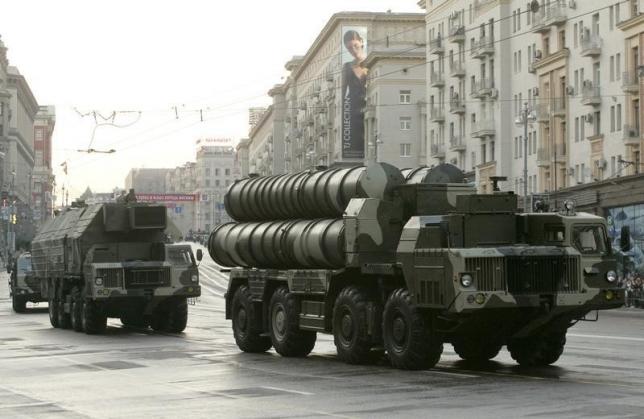
The sources said a Russian S-300 anti-aircraft system, sold to Cyprus 18 years ago but now located on the Greek island of Crete, had been activated during joint drills between the Greek and Israeli air forces in April-May this year.
US 'concerns' over Russian missile system
The activation allowed Israel's warplanes to test how the S-300's lock-on system works, gathering data on its powerful tracking radar and how it might be blinded or bluffed.
One defense source in the region said Greece had done so at the request of the United States, Israel’s chief ally, on at least one occasion in the past year. It was unclear whether Israel had shared its findings with its allies.
"Part of the maneuvers involved pitting Israeli jets against Greek anti-aircraft systems," one source said. Two other sources said the Crete S-300 was among the systems turned on.
The sources spoke to Reuters on condition they not be identified by name or nationality. The Greek and Israeli militaries declined to confirm or deny any use of the S-300 system during drills held in the Eastern Mediterranean last April-May or similar exercises in 2012 and 2010.
A senior Greek Defence Ministry official, asked whether the system was operating during Greek-Israeli military exercises, said: "At this moment the S-300 is not in operation." He said Athens' general policy was not to permit any other country to test the system's abilities.
The S-300, first deployed at the height of the Cold War in 1979, can engage multiple aircraft and ballistic missiles up to 300 km (186 miles) away. Israel is concerned by Russia's plan to supply S-300s to Iran.
India successfully tests upgraded interceptor missile
Israel says Egypt, with which it has a cold peace, has bought a variant of the system. The Israelis also worry about Moscow's announcement last month that it will deploy the S-300 or the kindred system S-400 from its own arsenal in Syria, in response to Turkey's shooting down of a Russian jet there.
Israel has bombed Syrian targets on occasion and is loath to run up against the Russians. Israeli Prime Minister Benjamin Netanyahu has met President Vladimir Putin at least twice in recent weeks to discuss coordination and try to avoid accidents.
Learning from friends
Igor Sutyagin, a Russian military expert with the Royal United Services Institute in London, said that for Israel training against the Crete S-300 would be "precisely what you need" to study the system's radar frequency, pattern and reach.
"If you know all these details then you are perfectly fitted to replicate this same signal, which means you have a chance to imitate, to sort of bluff-echo" the S-300, he said.
"You can brutally jam it," he said. "You can take the signal and return it, and then you send another ping which imitates the same signal. So instead of one target, the radar operator sees three, five or 10 and he does not know where to fire."
Tal Inbar, senior scholar for the Fisher Institute for Air and Space Strategic Studies near Tel Aviv, said S-300s in areas where Israel operates or might want to operate would challenge its advanced, US-backed military - but not insuperably so.
"In general, any system can be defeated this way or that. Some are harder and some are easier," he said. "The rule of thumb is that if your friends have a system that you are interested in, you can learn all kinds of things about it."
Feather in the cap: Pakistan successfully tests armed drone
The Crete S-300 was originally bought by Cyprus in 1997, triggering a vitriolic response from Turkey, its decades-old adversary. Under pressure from Britain and NATO, then Cypriot President Glafcos Clerides agreed to store the S-300 on Crete. A 2007 Greek-Cypriot arms swap formally transferred it to Athens.
Greece has experienced a boom in ties with Israel since Israel's once-strong alliance with Turkey broke down in 2010.
After this year's joint drill, Israel's official air force journal said maneuvers had involved all of Greece's air combat arm and "other apparatuses". It offered no details, but quoted an Israeli air force captain as saying the exercise had fostered "flexibility in thinking and dealing with the unknown".

1720097164-0/BeFunky-collage-(9)1720097164-0-165x106.webp)
1730446133-0/BeFunky-collage-(7)1730446133-0-165x106.webp)


1730545312-0/Express-Tribune-Web-(16)1730545312-0-270x192.webp)
1730537528-0/BeFunk_§_]-(26)1730537528-0.jpg)
1730540824-0/BeFunk_§_]-(28)1730540824-0.jpg)
1730541755-0/BeFunk_§_]-(29)1730541755-0.jpg)







COMMENTS (1)
Comments are moderated and generally will be posted if they are on-topic and not abusive.
For more information, please see our Comments FAQ